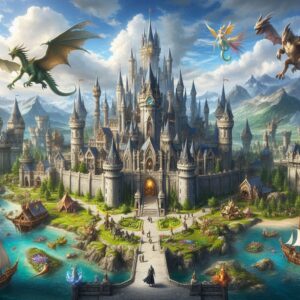In role-playing games, you take on the role of a character within an elaborate narrative. You make decisions that affect both your character’s growth and the storyline. The genre includes both old pen-and-paper games like Dungeons & Dragons and modern video games like The Witcher or Final Fantasy. Understanding the basics will assist in cutting through the complexity of the RPG of your choice.
Experiences vary across RPGs. Some are very story-laden, focusing on narrative and character interactions. Others prefer to highlight, usually through the vehicle of battles, combat strategy, and progression. Decide which type of RPG is for you through the type of setting it has—be it fantasy, a post-apocalyptic world, or a sci-fi universe. And since you’re a beginner, it wouldn’t hurt to start in games that are friendly to the user and offer tutorials or help for players new to the game.
 Every RPG has its terms. Phrases like “NPC” (Non-Player Character), “XP” (Experience Points), “quest”, and “inventory” are commonly used. Learn their meaning so you can focus on the story of the game.
Every RPG has its terms. Phrases like “NPC” (Non-Player Character), “XP” (Experience Points), “quest”, and “inventory” are commonly used. Learn their meaning so you can focus on the story of the game.
Character Creation
In most RPGs, you select a class and race for your character. Classes define your abilities and fighting style (e.g. warrior, mage, rogue), while races—humans, elves, dwarves, etc.—often provide special abilities and traits. Pick a class and race that fit your playstyle well.
Your character stats (strength, intelligence, dexterity, etc.) will influence your skill proficiency in combat situations. So be careful how you assign points according to the class you choose. For example, you’d want to put extra points in strength if you were playing a warrior or intelligence if you were playing a mage.
In many RPGs, there is a lot of room for customization, such as changing the appearance of your character. This might not always impact gameplay, but it can strengthen your bond with your character. So, take time to create a look you like. It can make your adventure more enjoyable.
Mastering the Mechanics
 Combat systems in RPGs differ. Some use turn-based processes while others use real-time action. Familiarize yourself with the combat system of your chosen title. In particular, games with complex mechanics benefit from practice. Take advantage of the in-game tutorials or beginner mode to have a taste of the fighting.
Combat systems in RPGs differ. Some use turn-based processes while others use real-time action. Familiarize yourself with the combat system of your chosen title. In particular, games with complex mechanics benefit from practice. Take advantage of the in-game tutorials or beginner mode to have a taste of the fighting.
Most RPGs contain some form of inventory management. The collection of items is vast, including weapons, armor, potions, and potentially crafting materials. Thus, it’s beneficial to keep your inventory academic as frequently as possible in order to equip yourself adequately. Sell or dispose of items you don’t need, to avoid clutter.
The narrative means everything in RPGs. Your quests are the waypoints in that story. Focus on the storyline and the objectives—that’s where you’ll really dive into the world of the game and be given important rewards. Don’t do the main story too fast. Side quests may give you the necessary experience and riches.
Leveling Up
Character progression is one of the most satisfying things in RPGs. You will earn experience points (XP) by completing quests and defeating enemies, which will result in level-ups.
Leveling up usually grants you skill points to spend. Focus on skills that boost your preferred playstyle. A stealthy rogue would prioritize agility and stealth skills, while a tanky warrior would invest in defense and strength.
Feel free to play around with new abilities and skills. Some RPGs give you the option of respect, meaning you can reset your ability points if you decide you don’t like your character’s build. This helps you achieve the best possible balance for your character.
Although it’s easy to be tempted to pick only offensive abilities, it’s just as important to have defensive skills. A lot of tactical play is damage mitigation, not just damage dealing. Going all-in may quickly lead to defeats, especially against powerful enemies.
 Strategies for Combat and Exploration
Strategies for Combat and Exploration
Make sure to make the most of the environment in the game when you’re exploring. Look for hidden paths, treasures, and shortcuts. In combat, use obstacles as cover or as strategic points to launch attacks.
Different enemies have different weaknesses and resistances. Notice the differences. Use the proper type of attack or element to exploit the weaknesses of the enemy. This can help make some difficult battles easier.
Make sure to save your game often. Many RPGs feature both manual and automatic save options, so be sure to use them. Saving often helps protect against losing a lot of progress if you run into a tough enemy or encounter a bad situation.
It is important to keep your character in peak condition. Rest at inns or use healing items to restore health and mana. Starting a fight with a character who has low health is asking for trouble.
If your RPG has a party component, then understand how your team works together. Have various roles in your party, such as tanks, healers, and damage dealers, and try to balance them. Use the strengths of each character during combat to your advantage.
Utilize Game Resources and Communities
Experienced gamers have created a wealth of online guides and tutorials. These resources can provide insight into game mechanics, optimal builds, and hidden secrets. Make use of them for a better understanding of the more complex parts of the game.
Get involved in community forums or subreddits dedicated to your chosen game. These spaces are filled with players who offer tips, strategies, and solutions for common issues. By participating, you can enrich your experience with the game.
If you are having trouble with certain aspects of the game, watching let’s plays or tutorial videos can help you understand it better visually. These videos usually show ways to play or hacks that are easier to understand when you see them in motion.